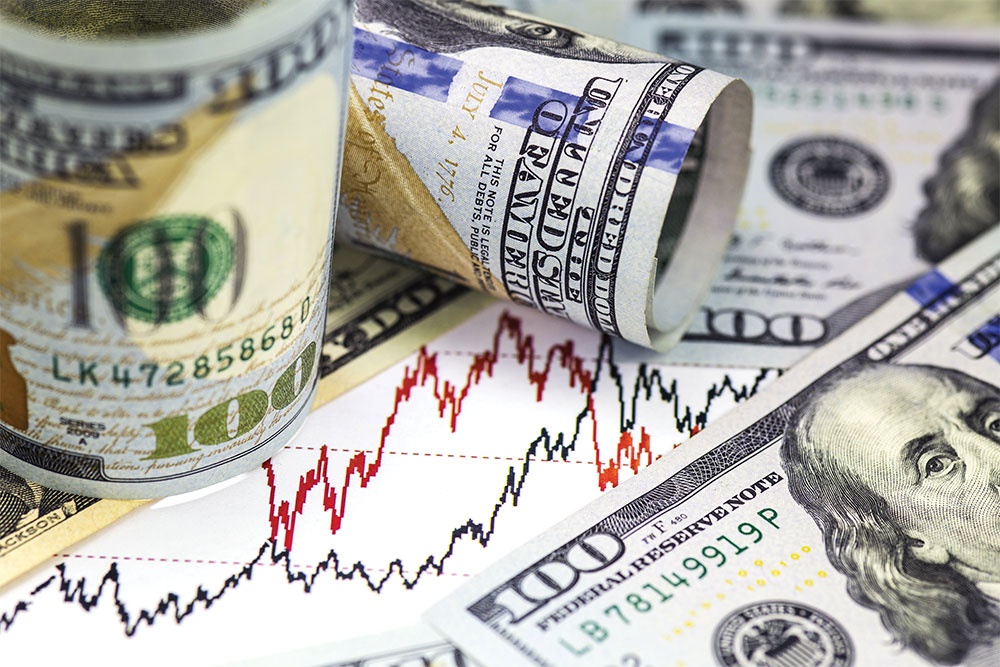Patience favoured before action on USD deposit interest rates
At the annual Vietnam Business Forum (VBF) held in Hanoi in March, foreign businesses discussed the USD deposit interest rate of zero per cent, and called for it to be removed.
However, an economic expert told VIR that the State Bank of Vietnam (SBV) has to implement the government’s anti-dollarisation policy, including the regulation on the ceiling interest rate for USD deposits, so it cannot be abolished at this time.
“The regulation of a zero per cent deposit interest rate in USD has contributed to reducing lending rates, helping businesses lower their production costs. At the same time, deposit interest rates in VND helped the SBV maintain exchange rate stability and support businesses with foreign currency revenue,” said the expert.
 |
| Patience favoured before action on USD deposit interest rates, illustration photo |
Regarding the proposal of foreign businesses at the VBF, he said that an ordinary citizen with a savings amount of about $5,000 or more, when deposited in many joint-stock commercial banks, could negotiate to still have a certain amount of interest transferred into VND, while businesses have their own ways to circumvent regulations to increase profits.
“Of course, it is understandable that businesses in general, especially foreign businesses, want to enjoy those profits conveniently. Banks, on the other hand, certainly do not want to have to find ways to circumvent regulations to retain customers. Personally, I agree that the regulation on USD deposit interest rate at zero per cent annually should be abolished, but not right now,” the expert said.
The SBV believes that it has created positive movement in the economy. The measure of the dollarisation level of the economy decreased from 11.06 per cent in 2014 to about 6.7 per cent as of February 2023.
The exchange rate and foreign currency market are stable, and the reduced foreign-currency-holding sentiment of organisations and individuals has contributed to the conversion of foreign currency resources into production and business services, and increased the scale of state foreign exchange reserves.
“In the current context, the zero annual interest rate policy for USD deposits is still having a positive effect. Therefore, we will continue to proactively monitor the economic, commercial, and financial developments inside and outside the country to have suitable monetary policy solutions,” the SBV said.
The SBV previously made its opinions on the issue clear, stating that in implementing the government’s policy against dollarisation, it had implemented a set of measures to control inflation, and stabilise macroeconomics through monetary policy and foreign exchange management.
Specifically, the key tools used were regulation of the USD deposit interest rate at zero per cent, flexible exchange rate management combined with strict control of foreign currency credit, and a roadmap to limit foreign currency lending.
The SBV said that with the synchronised policies and solutions, it has contributed to reducing dollarisation, gradually shifting the habit of borrowing-depositing foreign currencies of the economy to buy-sell relations. Thereby, it has enhanced the position of VND through maintaining the interest rate difference between VND and USD, encouraging the holding VND with attractive returns, and increasing the state’s foreign exchange reserves.
It also said that with the regulation of USD deposit interest, it has been creating economic incentives to encourage people and businesses to sell foreign currency to credit institutions instead of holding it in cash or as a foreign currency deposits, limiting the speculation and hoarding of foreign currencies.
Businesses and entities that have a demand for foreign currency for production and business and other legitimate needs are sold foreign currency by credit institutions as needed.
To gradually restrict dollarisation in the economy over a decade ago, in 2011 the SBV began implementing a cap on mobilisation interest rates in USD at credit institutions at 1 per cent per year for economic organisations, and 3 per cent a year for individuals.
| Can Van Luc - Chief economist, BIDV
The proposal to raise US dollar-denominated saving interest rates, if implemented, may inspire both businesses and people to put their dollar savings at banks, contributing to reducing dollar transfer outside for higher interest rates. However, at this point of time this recommendation needs to be carefully considered. Firstly, it is undeniable that keeping the interest rates of dollar-denominated savings at zero for nearly eight years has yielded several positive results as it has attuned to the government’s anti-dollarisation policy, helping to drive down dollar hoarding and speculation, contributing to converting part of dollar resources into the economy, stabilising the FX market, and enabling better inflation control. Secondly, some central banks may start policy reversals. The US Fed might only raise interest rates one more time this year, or maybe even start to reduce interest rates from 2024. If so, the US dollar saving interest rate gap between Vietnam and other countries would be narrowed. Any consideration, therefore, needs to be long-sighted, avoiding a radical change that is only momentary or just based on the interests of a particular group. Thirdly, as the current financial-monetary market contains many uncertainties, the introduction of new policies needs to be carefully evaluated. For instance, some foreign-invested firms might practice hoarding or transferring part of their profits in dollars abroad for higher interest rates, but it is also necessary to check how much money has been transferred via those methods. By contrast, if the current regulation on zero dollar saving interest rate is still retained, it needs a policy improvement so that domestic and foreign-invested groups can always access dollar sources in a legitimate and timely manner. At that time, concerns over the dollar deposit interest rate would also be soothed. |
What the stars mean:
★ Poor ★ ★ Promising ★★★ Good ★★★★ Very good ★★★★★ Exceptional
Related Contents
Latest News
More News
- Banking sector targets double-digit growth (February 23, 2026 | 09:00)
- Private capital funds as cornerstone of IFC plans (February 20, 2026 | 14:38)
- Priorities for building credibility and momentum within Vietnamese IFCs (February 20, 2026 | 14:29)
- How Hong Kong can bridge critical financial centre gaps (February 20, 2026 | 14:22)
- All global experiences useful for Vietnam’s international financial hub (February 20, 2026 | 14:16)
- Raised ties reaffirm strategic trust (February 20, 2026 | 14:06)
- Sustained growth can translate into income gains (February 19, 2026 | 18:55)
- The vision to maintain a stable monetary policy (February 19, 2026 | 08:50)
- Banking sector faces data governance hurdles in AI transition (February 19, 2026 | 08:00)
- AI leading to shift in banking roles (February 18, 2026 | 19:54)


 Tag:
Tag:




















 Mobile Version
Mobile Version